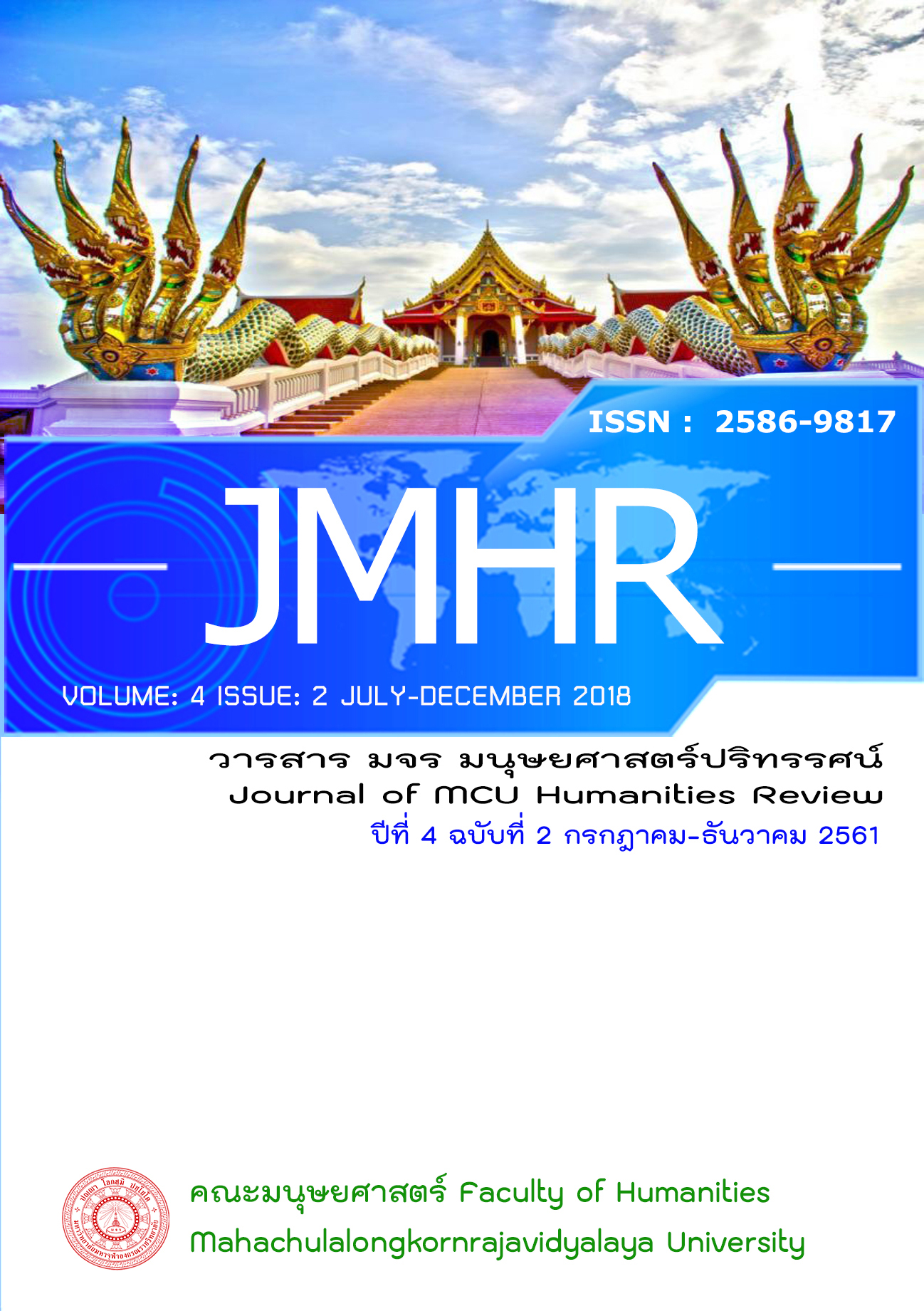A STUDY OF THE PROBLEMS OF ENGLISH SPEAKING SKILLS OF THE FIRST YEAR STUDENTS AT MAHACHULALONGKORNRAJAVIDYALAYA UNIVERSITY
บทคัดย่อ
The objectives of this research were 1) to study the Problems of English Speaking Skills of the first year students, majoring in English (Bilingual Program), Faculty of Humanities at Mahachulalongkornrajavidyalaya University. 2) to purpose the ways to improve English speaking skills for the first year students in the academic year 2016. The study was both qualitative and quantitative methods. The tool used for collecting data was questionnaires. The samplings were comprised 63 first year students. In-depth interview was conducted with 6 lecturers of MCU. The statistics used for analyzing data were Frequency, Mean, Standard Deviation (S.D.), and Percentage (%). The results of the research were as follows 1. The first year students, aged 18-20 years (27%) because of their practicing and aged 30 up years (19%) because of their practicing a little bit in English. were at a moderate high level (3.34%) 2. The first year students, aged 21-30 years can use speaking skills better than other ages comprising 54% were at a high level of (3.50%) Mean.
3. Students were very satisfied with the improvement of English speaking skills in daily conversation through practicing English speaking skills by watching BBC, CNN news. Self-confidence can also help speaking 3.57% were at the high level. Suggestions for the further study of the problems of English speaking skills of the first year students are: 1) students should be constantly speak English through public speaking especially to learn and understand using face to face communication as well as knowing more extensively vocabulary. 2) Enhancement in applying English sentence structures for interaction between people, so that students are able to improve their confidence in speaking English correctly and completely.
เอกสารอ้างอิง
Brown, H Douglas, Teaching by principles, (USA: Prentice Hall Regents, 1994.
Davies, P., & Pearse, P. Success in English teaching Oxford handbooks for language teachers. Oxford University Press.
Gslina Kavaliaukience, “Good Practice in Teaching ESP Presentaion”Journal for Teachers, (05.10.2006), [Online], Resource http-world.info/Articles_13 article Good Practice in Teaching Effective Public Speaking.htm, 11 Nov 2016.
Hemerka, Vacav. Low Speaking Performance in Learners of English, Masaryk University Brno, Faculty of Education Department of English Language and Literature, 2009.
Joan Robin, A review of Second Language Listening Comprehension Research, The Modern Language Journal, Vol.78, No. 2 (1994): 199-221.
Koenraad Kuiper and W. Scott Allan, an introduction to English Language, Sound, Word and Sentence, (Great Britain: The Bath Press, Avon, 1996).
Krashen, S. School libraries, public libraries, and the NAEP reading scores, (School Library Media Quarterly, 1995).
Littlewood, W., Foreign and second language learning, (Cambridge: Cambridge University Press, Littlewood, 1984), refer to “Speaking Difficulties Encountered by Young EFL Learners”, Samira Al Hosni, International Journal on Studies in English Language and Literature (IJSELL), Volume 2, Issue 6, (June2014).
Mihaljević Djigunović, J. Individual Differences in Early Language Programmes. In: Nikolov, M. (Ed.) The Age Factor and Early Language Learning. Monton de Gruyter (2009).
Nurmala Yusni Febriyanti, “ The use of Multimedia Teaching AIDS to Improve the Quality of the Speaking Teaching and Learning Process at the English Grade Class of SMP N6 Yogyakarta in the Academic Year of 2011/2012.” (2012), [Online]. Resource: https://eprints.ac.id./9431/2, 11 Nov 2016.
Prasatisonpreda, educational psychology, (Department of Counseling and Educational Psychology. Faculty of Education, Mahasarakham University, 1988).
Ramelan, Introduction to Linguistic, (Semarang: IKIP Press, 1992).






